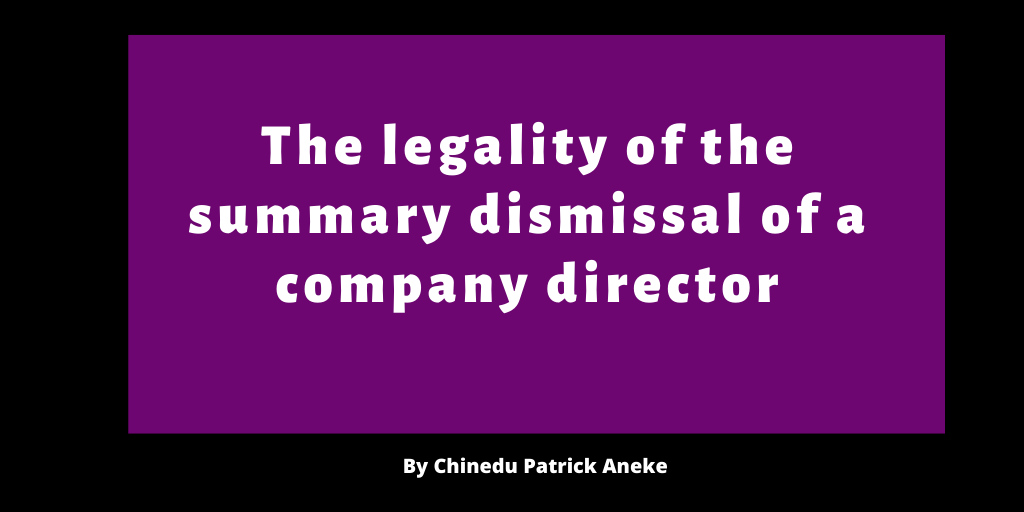Introduction
In the past months, attempts were made by companies and incorporated bodies to dismiss employees in a large scale due to the pandemic and the attending harsh economic realities in the country today. Persons employed to serve in the capacity of company directors were also affected in some cases by this widespread dismissal and in some cases, retrenchment of employees. At this point, it is important to note that there is a difference, in law, between the retrenchment of an employee and the dismissal of same. In this paper, focus is directed to the dismissal of a company director, the laws governing same and the legality or otherwise of summarily dismissing a company director.
It is settled principle that the employment of a company director is one with statutory flavor as has been held by the courts in motley of cases that when the conditions of service of an employee are provided for and protected by statute or regulation made thereunder, such a person is said to be in an employment with statutory flavor and is invested with a legal status higher than the ordinary master-servant relationship. See; LONGE V. FIRST BANK OF NIGERIA (2010) JELR 23211 (SC)
Accordingly, the COMPANIES AND ALLIED MATTERS ACT, 2020 (AS AMENDED) (hereinafter referred to as CAMA), specifically provides for the office of a company director, see Part A (IX) of CAMA, and thus company directors enjoy statutory flavored employment. The conditions of service of directors including appointment, remuneration, tenure and dismissal are provided for under the Act.
Dismissal of a company director
Determination of a contract of employment refers to the bringing to an end of the contract of employment between an employer and an employee. This may be by termination or dismissal. While they are certain differences between termination and dismissal, dismissal is one of the means by which a contract of employment can be terminated. According to the BLACK’S LAW DICTIONARY B A, GARNER, BLACK’S LAW DICTIONARY, (8TH EDN ST. PAULS MINN: WEST PUBLISHING, 2004) P. 502, to dismiss means to terminate something (action or claims) without further hearing, to release or discharge a person from employment.
However, termination and/or the dismissal of statutory flavored employment can only be done in the manner allowed by the statute providing for such office. See; KUNLE OSISANYA V. AFRIBANK NIGERIA PLC (2007) JELR 42617 (SC). Accordingly, SECTION 288 of the CAMA provides for the guidelines that must be followed for the valid removal of a company director. Conjunctively, subsections one to three of the said section is paraphrased below:
- A company can remove a director by ordinary resolution before the expiration of the time of his office;
- Such director sought to be removed from office must be given special notice of the intended resolution to remove him or her;
- Upon receipt of the notice of the intended resolution to be removed, the affected director, if he so wishes shall be allowed to make representations in writing to the company.
The combined effect of the above is that before a company director can be validly dismissed, he or she must be given notice of the intention to dismiss and also be given an opportunity to be fairly heard by the company. EVANS BROS LTD V. FALAIYE (2002) JELR 52509 (CA)
From the foregoing provisions of the CAMA and the legion of judicial authorities on this subject matter, it is evident that a company director cannot be validly dismissed summarily. Summary dismissal is a common law right of an employer to determine the contract of an employee without notice or payment in lieu of notice on account of gross misconduct attacking the root of the contract of employment. See A.C.B. V NBISIKE (1995) JELR 41513 (CA), OLATAMBOSUN V. NISER COUNCIL (1988) 3 NWLR (PT. 80) 25.
In summary dismissal, the requirement of notice and fair hearing which are conditions precedent to the valid removal and/or dismissal of a company director are absent and accordingly make any purported summary dismissal of a director invalid.
However, the contentious issue upon which the court has reached conflicting decisions is whether a company director on probation can be summarily dismissed. On this issue, the courts have held on the one hand that where an employee is on probation the employee is not entitled to fair hearing before dismissal by the employer whether the employee’s employment has statutory flavor or not. See; IHEZUKWU V. UNIVERSITY OF JOS (1990) JELR 43009 (SC)
However, on the other hand, the courts have also held that an employee with a statutory flavored contract of employment, who is on probation, is entitled to fair hearing before termination or dismissal. In UDO V. CROSS RIVER STATE NEWSPAPER CORP (2001) 22WRN 53, the general manager of the respondent company was awarded damages for the failure of the respondent to give him a fair hearing prior to his dismissal notwithstanding the fact that he was on probation. The court held that the appellant’s employment was statutorily protected and thus was entitled to fair hearing before dismissal. ADEYEMO V. OYO STATE PUBLIC SERVICE COMMISSION (1979) 1FNLR 28
The writer respectfully aligns himself with the decisions of the court in the latter cases because, as was earlier established, the mere fact that an employment is provided for by a statute or a regulation there under, vests on the employee a higher legal status, than in a mere master-servant relationship.
The consequences of the unlawful dismissal of a company director is that such unlawfully dismissed director shall be reinstated and as held by the court in F.M.C. IDO-EKITI V. OLAJIDE (2011) 11 NWLR (PT 1) 260-262, where the dismissal of an employment with statutory flavor is unlawful, the effect is that the employee never left his employment and would be entitled to all his salaries and allowances for the time he was unlawfully dismissed. GOV. OF KWARA STATE V. OJISARA (2007) ALL NWLR (PT 348) 37
Therefore, in conclusion, a company director cannot be summarily dismissed as the rules set out by the CAMA in relation to the removal of a company director expressly require that notice be given to the director and that the director be granted fair hearing. Any such attempt to summarily dismiss a company director is unlawful and shall be deemed to be null and void.
This blog post is written by our guest writer Chinedu Patrick Aneke




